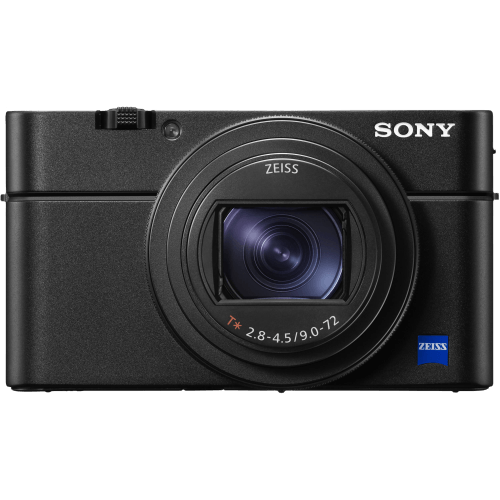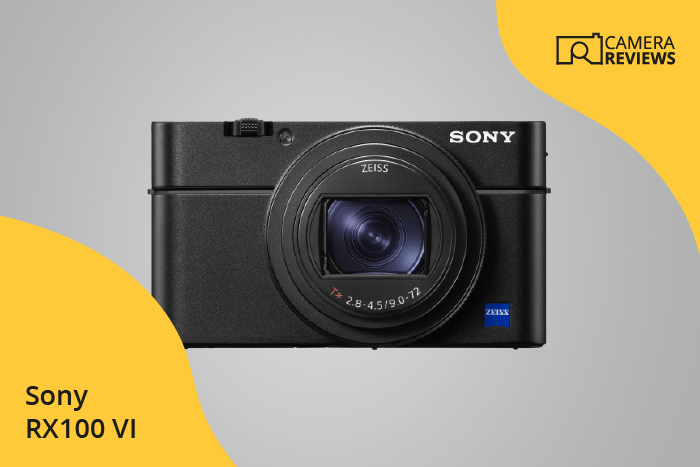Sony Cyber-shot RX100 VI Specs and Scores

The Sony Cyber-shot RX100 VI receives a score of 69/100, which reflects its general specifications. Announced on June 5, 2018, this compact camera entered the market with a launch price of $1200. Measuring 102 x 58 x 43mm and weighing 301g (0.66lbs), it offers a relatively convenient size and weight for users.
While the specifications of the RX100 VI may not be groundbreaking, they still hold up well in today’s market. This camera is a reliable choice for those seeking a compact yet capable device.
Sony Cyber-shot RX100 VI Overview and Optics
The Sony Cyber-shot RX100 VI receives a score of 67/100 for its optics. This camera features a 20-megapixel CMOS sensor with a 1-inch size and an aspect ratio of 3:2. The Bionz X processor ensures fast performance, and the shooting speed of 24 frames per second allows for capturing fast-moving subjects. The fixed lens mount means that the lens cannot be changed, but the camera does have image stabilization.
The DXOMARK score for the sensor is 82, which is competitive in today’s market. The optics of this camera are suitable for various photography needs, especially for those who do not require interchangeable lenses. The image stabilization is a valuable feature for capturing sharp images in different shooting situations.
The Sony Cyber-shot RX100 VI offers solid optics for a compact camera. Its specifications make it a reliable choice for photographers who value image quality, speed, and convenience in a small package.
Sony Cyber-shot RX100 VI Video Performance
The Sony Cyber-shot RX100 VI boasts a video score of 77/100. This camera offers a maximum video resolution of 4K, with dimensions of 3840 x 2160, ensuring high-quality video capture. Additionally, the RX100 VI is capable of a maximum video frame rate of 120fps, providing smooth, slow-motion footage.
Despite its impressive specifications, the RX100 VI lacks built-in time-lapse functionality, which is a sought-after feature in today’s market. This omission may limit its appeal to some users. Nevertheless, the Sony Cyber-shot RX100 VI remains a strong contender in the realm of video capabilities, thanks to its high resolution and frame rate.
Sony Cyber-shot RX100 VI Features and Benefits
The Sony Cyber-shot RX100 VI has a feature score of 83/100, which places it among the top cameras in its category. This camera boasts a 3-inch touchscreen with a resolution of 1228800 dots, ensuring clear and vibrant visuals during shooting and playback. The flip screen allows for versatile shooting angles and easy self-portraits.
Equipped with GPS, WIFI, and Bluetooth capabilities, the RX100 VI offers seamless connectivity and location tagging for effortless sharing and organization of your photos. These features make it a strong competitor in today’s market, as they cater to the needs of modern photographers who value convenience and ease of use.
The RX100 VI’s impressive feature set makes it a highly desirable camera for both casual and experienced photographers. Its combination of a high-resolution touchscreen, flip screen, and various connectivity options ensure that it stands out among its peers.
Sony Cyber-shot RX100 VI Storage and Battery
The Sony Cyber-shot RX100 VI receives a storage and battery score of 29/100. This camera has one memory card slot that accepts SD, SDHC, SDXC, Memory Stick Pro Duo, and Pro-HG Duo cards. The battery life, however, is relatively short, offering only 250 shots per charge using the NP-BX1 battery type. Despite this, the camera supports USB charging for added convenience.
In the context of today’s market, the single memory card slot and limited battery life might not meet the demands of professional photographers or those looking for extended shooting capabilities. Nonetheless, the USB charging option can help mitigate these limitations to some extent.
Sony Cyber-shot RX100 VI Alternatives
Do you want to know how the Sony Cyber-shot RX100 VI compares to its competitors? Have a look at the most popular comparisons for this camera below:
- Canon EOS R50 vs Sony Cyber-shot RX100 VI
- Canon PowerShot G7 X Mark III vs Sony Cyber-shot RX100 VI
- Nikon D7200 vs Sony Cyber-shot RX100 VI
- Nikon Z6 II vs Sony Cyber-shot RX100 VI
- Sony Cyber-shot DSC-RX100 VII vs Cyber-shot RX100 VI
- Canon PowerShot G5 X Mark II vs Sony Cyber-shot RX100 VI
Sony Cyber-shot RX100 VI FAQ
Does the Sony Cyber-shot RX100 VI Have Built-in Image Stabilization?
Yes, the Sony Cyber-shot RX100 VI features built-in Optical SteadyShot image stabilization, which helps reduce camera shake and produce sharper images, especially in low light conditions.
Does the Sony Cyber-shot RX100 VI Support 4K Video Recording?
Yes, the Sony Cyber-shot RX100 VI supports 4K video recording at 30fps, providing high-quality videos with exceptional detail and clarity for a compact camera.
What Size Sensor Does The Sony Cyber-shot RX100 VI Have?
The Sony Cyber-shot RX100 VI is equipped with a 1-inch Exmor RS CMOS sensor, which offers excellent image quality and low-light performance for a compact camera.
Does the Sony Cyber-shot RX100 VI Have a Dual Memory Card Slot?
No, the Sony Cyber-shot RX100 VI has a single memory card slot, which supports SD, SDHC, and SDXC memory cards, including UHS-I and UHS-II formats.
Does the Sony Cyber-shot RX100 VI Have a Touch Screen?
Yes, the Sony Cyber-shot RX100 VI features a 3-inch tilting touchscreen LCD, which allows for easy navigation, focus point selection, and image review.
Does the Sony Cyber-shot RX100 VI Have Wi-Fi and Bluetooth?
Yes, the Sony Cyber-shot RX100 VI has both Wi-Fi and Bluetooth connectivity, enabling wireless image transfer, remote camera control, and easy sharing to compatible devices.
Does the Sony Cyber-shot RX100 VI Have GPS?
Yes, the Sony Cyber-shot RX100 VI has GPS functionality, allowing for automatic geotagging of images and easy organization based on location.
Is the Sony Cyber-shot RX100 VI Weather Sealed?
Yes, the Sony Cyber-shot RX100 VI features a weather-sealed construction, making it resistant to dust and moisture, allowing for use in various shooting conditions.
Does the Sony Cyber-shot RX100 VI Have a Built-in Flash?
Yes, the Sony Cyber-shot RX100 VI has a built-in pop-up flash, which provides additional lighting when needed and can be useful for fill-flash in bright conditions.

